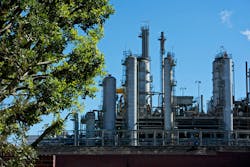Phillips 66 to permanently shutter Los Angeles refinery
Phillips 66 Co. will permanently cease conventional crude oil processing operations its 138,700-b/d dual-sited refinery in Los Angeles, Calif., by yearend 2025 amid the operator’s determination that market conditions will prevent the long-term viability and competitiveness of the manufacturing site.
“With the long-term sustainability of our Los Angeles refinery uncertain and affected by market dynamics, we are working with leading land development firms to evaluate the future use of our unique and strategically located properties near the Port of Los Angeles,” Mark Lashier, Phillips 66 chairman and chief executive officer said on Oct. 16.
Despite the pending closure—which is scheduled for completion by the end of fourth-quarter 2025—Phillips 66 said it remains committed to serving California and will continue to take the necessary steps to meet ongoing commercial and consumer demand for fuels within the state.
Noting the decision’s impact on regional employment, Lashier said the company will work “to help and support [individuals impacted by the closure] through this transition.”
Consisting of the 235-acre Carson, Calif., location that processes crude oil and the pipeline-linked 424-acre Wilmington, Calif., site where intermediate products delivered from Carson are upgraded into finished products, the Los Angeles refinery currently includes about 600 permanent employees and 300 contract workers, Phillips 66 said.
Citing and confirming its support for analysis from the California Energy Commission (CEC) showing the critical necessity for expanding regional supply capabilities, Phillips 66 said it will work with the state to maintain current and potentially increase supply levels to meet consumer needs.
In addition to supplying gasoline from its own refining network—including renewable diesel and sustainable aviation fuel (SAF) from its recently commissioned Rodeo Renewable Energy Complex (RREC) in the San Francisco Bay area, the company confirmed it will also secure supplies for regional markets from third-party sources.
In the meantime, the operator said it has engaged real estate-development firms Catellus Development Corp. and Deca Companies LLC to evaluate the potential future uses of the combined 650-acre Los Angeles sites via a process in which Phillips 66 will serve an advisory role in helping advance potential commercial development options supporting the regional economy and other key stakeholder objectives.
“These sites offer an opportunity to create a transformational project that can support the environment, generate economic development, create jobs, and improve the region’s critical infrastructure,” Lashier said.
While the operator made no mention of any plan for its own use of the soon-to-be mothballed Los Angeles operations, Phillips 66 previously converted its former conventional San Francisco refinery in Rodeo, Calif., into the RREC manufacturing hub exclusively dedicated to production of renewable fuels (OGJ Online, Apr. 2, 2024).
Earlier in the year, Phillips 66 achieved full-capacity targets of the RREC by increasing combined production rates of renewable diesel and SAF to about 50,000 b/d (800 million gal/year) (OGJ Online, Jun. 26, 2024).
Legislative shadow
Whether intended or not, timing of Phillip 66’s announcement of the proposed Los Angeles refinery closure follows California Gov. Gavin Newsom’s Oct. 14 signing of legislation aimed at making the state’s oil refiners manage California’s gasoline supplies more responsibly to prevent price spikes at the pump.
Known as Assembly Bill No. 1, the legislation provides the CEC more tools for requiring petroleum refiners to backfill supplies and plan for maintenance downtime as a means of helping prevent gas-price spikes that cost Californians upwards of $2 billion in 2023, according to a release from Newsom’s office.
Introduced in early September in response to Newsom’s late-August proclamation convening the state’s legislature into special session “to take on Big Oil’s gas-price spikes,” the new legislation allows the state to require that refiners maintain a minimum inventory of fuel to avoid supply shortages that “create higher gasoline prices for consumers and higher profits for the industry,” the governor’s office said.
“Gas price spikes are profit spikes for Big Oil, and California won’t stand by as families get gouged,” Newsom said in a Sept. 3 release.
Further amendments to the bill underscore workforce protections, emphasizing the need for any regulations adopted by the CEC to protect the health and safety of employees, local communities, and the public, including preserving existing standards and rules that protect refinery workers, such as rules granting them authority to provide emergency refinery shutdowns and maintenance when needed for safety.
About the Author
Robert Brelsford
Downstream Editor
Robert Brelsford joined Oil & Gas Journal in October 2013 as downstream technology editor after 8 years as a crude oil price and news reporter on spot crude transactions at the US Gulf Coast, West Coast, Canadian, and Latin American markets. He holds a BA (2000) in English from Rice University and an MS (2003) in education and social policy from Northwestern University.

